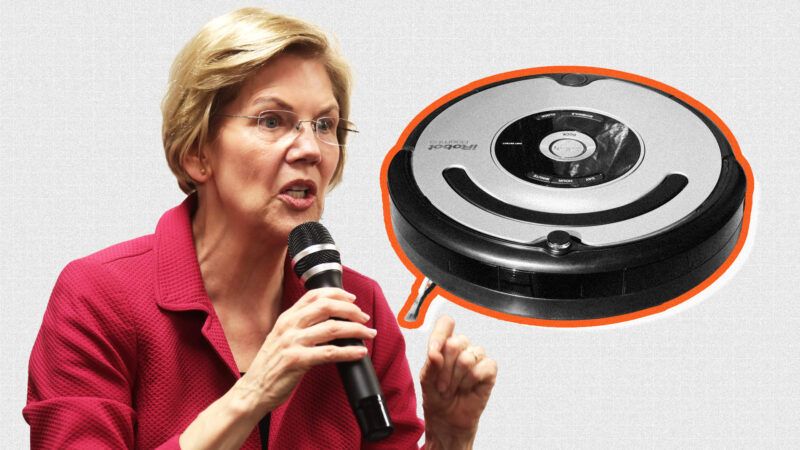iRobot Lays Off 350 Employees as Amazon Kills Merger Elizabeth Warren Opposed
The robot vacuum company is based in Massachusetts, meaning some of the terminated employees are likely Warren's constituents.

Today, Amazon terminated its planned acquisition of iRobot, manufacturer of Roomba robot vacuums, as the companies saw "no path to regulatory approval." iRobot then announced that it would be cutting nearly one-third of its work force.
While the companies blamed regulators in the European Union for the termination, meddlesome U.S. lawmakers played their own part in souring the deal.
In August 2022, Amazon announced its intent to buy iRobot for $1.7 billion. The acquisition would complement Amazon's growing stable of smart home products, like Echo Hub control panels and Ring video doorbells.
The following month, the Federal Trade Commission (FTC) began an investigation of the merger, and lawmakers weighed in soon after. In a letter to FTC Chair Lina Khan, Sen. Elizabeth Warren (D–Mass.) and five Democratic representatives recommended that "the FTC should use its authority to oppose the Amazon–iRobot transaction" as the acquisition "could harm consumers and reduce competition and innovation in the home robotics market."
The letter referenced a Bloomberg article about the proposed merger, which noted that "iRobot's Roomba dominates the smart vacuum market with a 75% market share by revenue in the US." The lawmakers cited the FTC's antitrust authority and "Amazon's history of anticompetitive practices" as reasons the agency should oppose the merger.
In November 2023, the European Commission issued a Statement of Objections in conjunction with its own review. The commission worried the deal "may restrict competition in the market for robot vacuum cleaners." It noted that "because Amazon's online marketplace is a particularly important channel" for selling robot vacuums, Amazon "may have the ability and the incentive to foreclose iRobot's rivals" either by excluding them from its marketplace or by "degrading their access to it."
Notably, the United Kingdom—which is no longer part of the European Union—approved the merger in June 2023. At the time, the nation's Competition and Markets Authority "concluded that the deal would not lead to competition concerns in the UK."
Earlier this month, Politico reported that Amazon had until January 10 to offer concessions that may address the European Commission's concerns; Amazon let the deadline lapse without offering any concessions.
Today, the companies jointly announced the termination of the acquisition deal, seeing "no path to regulatory approval in the European Union." Soon after, iRobot announced "an operational restructuring plan," in which it would lay off 350 employees—31 percent of its work force. Co-founder and CEO Colin Angle, who was expected to remain in charge under the terms of the merger, would step down.
While Europe's concerns may have been what soured the deal, it seems the U.S. lawmakers who asked the FTC to oppose the deal also got their wish.
But the complaints from the E.U. and lawmakers like Elizabeth Warren are overblown. Acquiring iRobot would not have denied consumers the ability to purchase robot vacuums: While Roomba may be the best-selling, companies like Shark and Eufy make their own competitive versions, including at lower prices than a Roomba. In its list of the best robot vacuums of 2024, Wirecutter recommended no iRobot products, citing poor performance when compared to competitors.
Meanwhile, as the companies waited on regulators, iRobot was losing money: The company took out a $200 million bridge loan in July 2023 to tie it over until the deal closed (at which point Amazon lowered its offer to account for the new debt). With the deal scuttled, Amazon will now pay a $94 million termination fee, but iRobot expects to report an operating loss of as much as $285 million for 2023.
It's worth wondering, then, if this is what lawmakers like Warren had in mind. The FTC letter worried the merger "could harm consumers and reduce competition and innovation in the home robotics market." But without the merger, iRobot could very well face insolvency, and nearly one-third of its work force will lose their jobs—and considering the company is based in Massachusetts, a substantial number of them may very well be Warren's constituents.


Show Comments (35)